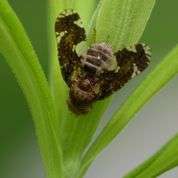Plant sniffs out danger to prepare defenses against pesky insect

A plant may start to prime its defenses as soon as it gets a whiff of a male fly searching for a mate, according to Penn State entomologists. Once tall goldenrod plants smell a sex attractant emitted by true fruit fly males, they appear to prepare chemical defenses that make them less appealing to female flies that could damage the plants by depositing eggs on them, the researchers said.
"It's become increasingly clear in recent years that plants are responsive to odors," said Mark Mescher, assistant professor of entomology. "But previous examples of this are all plant-to-plant. For example, some plants have been shown to respond to the odor of insect-damaged neighbors by priming their own defenses. What's new about this is that it seems that plants may sometimes be able to smell the insects themselves."
A tall goldenrod plant's reaction to these odors also appears to make it less attractive to other insects that might feed on it, according to the researchers, who reported their findings in the current issue of Proceedings of the National Academy of Sciences.
In a field study, the researchers exposed some plants to the odor of the male fly and then counted the number of exposed and unexposed plants on which female flies laid eggs by noting the distinctive scarring that occurs when females puncture the stem to lay their eggs inside, Mescher said.
The researchers found that females were significantly less likely to lay eggs on plants exposed to the male emission and about four times more likely to lay eggs on plants in a control group that were not exposed to this odor cue.
Compared to the control group, other herbivores, such as beetles, also caused significantly less damage to of the tall goldenrod plants exposed to the fly emissions, both in the field and in laboratory experiments. "It would seem that the plant senses the odor of the fly," Mescher said. "Then, it primes its defenses so that it can respond faster to the threat."
Over years of evolution, the true fruit fly has established a close relationship with tall goldenrod, according to Mescher, who worked with Anjel Helms, doctoral student in ecology; Consuelo De Moraes, professor of entomology; and John Tooker, assistant professor of entomology.
The male fly, which in the Northeast usually emerges in mid-May, perches on the upper leaves of the tall goldenrod plants and emits a chemical blend that may act as an attractant to the female flies, which emerge later, according to Tooker. Once a female mates with the male, it deposits its eggs in the stem of the plant. Tooker said that the female flies lay their eggs only in tall goldenrod plants, so there is a close association between the two species.
A few weeks after the fly's eggs hatch a bulbous growth, called a gall, appears on the stem of the tall goldenrod plant. The gall does not kill the tall goldenrod, but Tooker said the galled plant does not produce as many seeds as ones without galls. Its seeds also tend to be smaller and less likely to germinate.
"It seems that plants that are able to anticipate an attach by the fly and defend themselves against this damage will be more successful, producing higher quality seeds for the next generation," Tooker said. "So there must be a strong advantage for plants that can perceive the fly odor."
The researchers are not sure how tall goldenrod plants are able to detect the odor of the fly. "Our understanding of plant olfaction in general remains quite limited," said Mescher.
But, the researchers said they believe that other plants may use insect odors to detect danger and prepare defenses. "I suspect that this may be happening in many plants," said Tooker. "But we don't yet know how widespread it is."
Journal information: Proceedings of the National Academy of Sciences
Provided by Pennsylvania State University




















